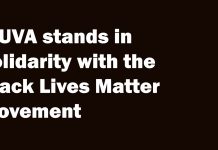Overnight, international and domestic students alike were left scrambling to make sense of the new Immigration and Customs Enforcement (ICE) announcement: international students taking online-only classes this fall must leave America.
As we adjust to a bevy of changes outlined in the Fall Reopening Plan, from classes moving online to the regulation of common areas in dorms, the new guidelines mean that international students at UVA must also attend at least one in-person class or depart the country. If UVA decides at any point in the semester to go fully online, following Harvard’s footsteps, these students must either transfer to a school with in-person instruction, leave, or face “immigration consequences including, but not limited to, the initiation of removal proceedings”.
While reading this on the night of its release, my phone buzzed with tweets of disbelief, check-ins from friends, and a flurry of messages from other international students with the same questions:
Will UVA stick to the hybrid plan? What’s the cut-off size for classes to remain in-person? If we have to leave, how will we take online classes in different time zones, with varying degrees of infrastructure to support our learning?
ICE just changed visa conditions for millions of international students with no notice. The reasoning behind this is so outrageously cynical I can barely process it. The Trump govt. is armtwisting unis into opening for fall by holding intl student labor (and fees) hostage. https://t.co/vnw9s4nHlc
— Shalmi ? (@Ornithophobix) July 6, 2020
This is a summary of the new guidelines:
- If your university is going entirely online, you must leave America to take your classes remotely.
- If your university is continuing in-person classes, you are limited to doing 3 credit hours online, and take the rest in person.
- If your university is conducting “hybrid” classes, you must take at least one class in person.
Point 1 does not take into account students who are stranded in the US due to COVID-19 or travel regulations in their own country; even if they can return home, they may have to take classes when the rest of their country is asleep, or not even have Wifi. Point 2 concerns students who have already returned home due to COVID-19 but are affected by this travel ban: if they do not return to the US to continue their studies, their visa status will be terminated. Point 3 essentially forces international students to take in-person classes, whether it be enrolling in a small class at the last minute or even transferring to a different university.
UVA is currently planning to conduct hybrid classes, although it is not known which classes will still be conducted in person. A professor I wrote to informed me that faculty were notified of the announcement the day it was released, and they were awaiting further guidance on their options.
Amidst an unprecedented health crisis with no end in sight, the guidelines make no sense. An economic analysis by NAFSA states “international students studying at U.S. colleges and universities contributed $41 billion and supported 458,290 jobs to the U.S. economy during the 2018-2019 academic year.” The American Council on Education projected a 25% decline in international student enrollment this fall, with a $23 billion revenue loss for institutions. Not only do international students often pay full tuition at these institutions, we have worked hard to leave our countries for a better education here. The sudden announcement has left many of us here anxious and mired in confusion.
At the moment, schools going fully online must complete and submit an operational change plan to the Student and Exchange Visitor Program (SEVP) by Wednesday, July 15. Till then, we can only wait.
This is the ICE announcement in full:
WASHINGTON – The Student and Exchange Visitor Program (SEVP) announced modifications Monday to temporary exemptions for nonimmigrant students taking online classes due to the pandemic for the fall 2020 semester. The U.S. Department of Homeland Security plans to publish the procedures and responsibilities in the Federal Register as a Temporary Final Rule.
Temporary exemptions for the fall 2020 semester include:
- Nonimmigrant F-1 and M-1 students attending schools operating entirely online may not take a full online course load and remain in the United States. The U.S. Department of State will not issue visas to students enrolled in schools and/or programs that are fully online for the fall semester nor will U.S. Customs and Border Protection permit these students to enter the United States. Active students currently in the United States enrolled in such programs must depart the country or take other measures, such as transferring to a school with in-person instruction to remain in lawful status. If not, they may face immigration consequences including, but not limited to, the initiation of removal proceedings.
- Nonimmigrant F-1 students attending schools operating under normal in-person classes are bound by existing federal regulations. Eligible F students may take a maximum of one class or three credit hours online.
- Nonimmigrant F-1 students attending schools adopting a hybrid model—that is, a mixture of online and in person classes—will be allowed to take more than one class or three credit hours online. These schools must certify to SEVP, through the Form I-20, “Certificate of Eligibility for Nonimmigrant Student Status,” certifying that the program is not entirely online, that the student is not taking an entirely online course load this semester, and that the student is taking the minimum number of online classes required to make normal progress in their degree program. The above exemptions do not apply to F-1 students in English language training programs or M-1 students pursing vocational degrees, who are not permitted to enroll in any online courses.
Schools should update their information in the Student and Exchange Visitor Information System (SEVIS) within 10 days of the change if they begin the fall semester with in-person classes but are later required to switch to only online classes, or a nonimmigrant student changes their course selections, and as a result, ends up taking an entirely online course load. Nonimmigrant students within the United States are not permitted to take a full course of study through online classes. If students find themselves in this situation, they must leave the country or take alternative steps to maintain their nonimmigrant status such as a reduced course load or appropriate medical leave.
Due to COVID-19, SEVP instituted a temporary exemption regarding online courses for the spring and summer semesters. This policy permitted nonimmigrant students to take more online courses than normally permitted by federal regulation to maintain their nonimmigrant status during the COVID-19 emergency.
F-1 nonimmigrant students pursue academic coursework and M-1 nonimmigrant students pursue vocational coursework while studying in the United States.
















